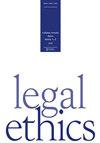Lawyers, mental illness, admission and misconduct
IF 0.3
Q1 LAW
引用次数: 1
Abstract
ABSTRACT Since 2004 in Australia, there has been a significant amount of interest in the issues of lawyers and mental illness. As a result there is now a substantial body of literature that examines legal education and its links to lawyer distress. In the profession, there has been a growing awareness of lawyer mental illness and the growth of professional development and lawyer support. Less attention, however has been paid to the links between mental illness and misconduct and the ways in which mental illness is treated in disciplinary proceedings. This article seeks to address this gap by examining cases of disciplinary misconduct over the past 10 years in which mental illness is raised as a causal or a contributing factor. We have found that the law relating to mental illness and misconduct is still developing. Our analysis finds that courts and tribunals are, overall, sensitive to lawyer mental illness and that they are achieving an appropriate balance between the rights of the lawyer and protecting those of the public and the reputation of the legal profession. The paper will draw out the principles currently being used by the courts to assess the effects and implications of a lawyer’s mental illness on claims of misconduct.律师,精神疾病,认罪和不当行为
自2004年以来,在澳大利亚,人们对律师和精神疾病的问题产生了极大的兴趣。因此,现在有大量的文献研究法律教育及其与律师困境的联系。在律师行业,人们对律师精神疾病的认识和对律师专业发展的支持越来越多。然而,对精神疾病与不当行为之间的联系以及在纪律程序中对待精神疾病的方式的关注较少。这篇文章试图通过检查过去10年的纪律不端案件来解决这一差距,在这些案件中,精神疾病被认为是一个因果或促成因素。我们发现,有关精神疾病和不当行为的法律仍在发展中。我们的分析发现,总的来说,法院和法庭对律师的精神疾病很敏感,他们在律师的权利和保护公众的权利以及法律职业的声誉之间取得了适当的平衡。该文件将列出法院目前使用的原则,以评估律师的精神疾病对不当行为索赔的影响和影响。
本文章由计算机程序翻译,如有差异,请以英文原文为准。
求助全文
约1分钟内获得全文
求助全文

 求助内容:
求助内容: 应助结果提醒方式:
应助结果提醒方式:


